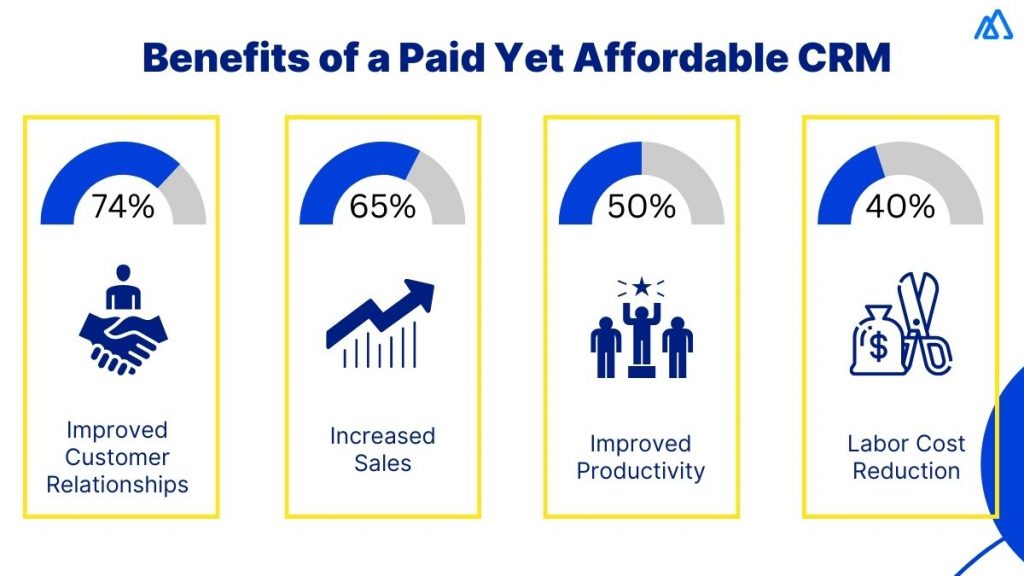Boosting Business with CRM: Affordable Options for Small Business Owners
Boosting Business with CRM: Affordable Options for Small Business Owners

Boosting Business with CRM: Affordable Options for Small Business Owners
As a small business owner, you wear many hats. You’re the CEO, the sales team, the marketing guru, and the customer service expert all rolled into one. Managing your time and resources efficiently is crucial to keep your business running smoothly. One tool that can help you achieve this is a Customer Relationship Management (CRM) system.
In this article, we’ll explore what CRM is, its benefits for small businesses, and some affordable options that can help you get started. Whether you’re just starting out or looking to upgrade your current system, we’ve got you covered.
What is CRM?
Customer Relationship Management is a technology that helps you manage your interactions with customers, clients, and prospects. It’s like having a personal assistant that keeps track of all your contacts, communications, and sales data in one place.
A CRM system typically includes features like:
- Contact management: storing customer information and contact details
- Sales management: tracking sales pipelines, leads, and opportunities
- Marketing automation: automating tasks and campaigns
- Customer service: managing support tickets and customer inquiries
- Reporting and analytics: getting insights into your business performance

Benefits of CRM for Small Businesses
Implementing a CRM system can bring numerous benefits to your small business. Here are some of the most significant advantages:
- Improved customer relationships: A CRM system helps you stay organized and focused on your customers’ needs, leading to stronger relationships and increased loyalty.
- Increased sales: By tracking sales pipelines and leads, you can identify new opportunities and close deals faster.
- Enhanced productivity: Automating tasks and streamlining processes saves you time and energy, allowing you to focus on high-priority tasks.
- Better decision-making: With data-driven insights, you can make informed decisions about your business and stay ahead of the competition.
Affordable CRM Options for Small Business
You don’t need to break the bank to get a robust CRM system. Here are some affordable options that are perfect for small businesses:
- HubSpot CRM: HubSpot offers a free CRM plan that’s perfect for small businesses. You get access to features like contact management, sales pipeline tracking, and meeting scheduling.
- Pricing: Free (basic plan), $40/user/month (starter plan)
- Zoho CRM: Zoho CRM offers a free plan that includes features like lead and opportunity management, sales pipeline tracking, and workflow automation.
- Pricing: Free (basic plan), $12/user/month (standard plan)
- Freshsales: Freshsales is a cloud-based CRM that offers a free trial and a basic plan that’s affordable for small businesses.
- Pricing: $12/user/month (blossom plan), $35/user/month (garden plan)
- Pipedrive: Pipedrive is a sales-focused CRM that offers a free trial and a basic plan that’s designed for small businesses.
- Pricing: $15/user/month (silver plan), $30/user/month (gold plan)
- Airtable: Airtable is a cloud-based database that can be used as a CRM. It offers a free plan and a basic plan that’s affordable for small businesses.
- Pricing: Free (basic plan), $12/user/month (plus plan)
Tips for Choosing the Right CRM
With so many CRM options available, it can be overwhelming to choose the right one for your business. Here are some tips to help you make an informed decision:
- Define your needs: Identify the features you need in a CRM system and prioritize them.
- Consider scalability: Choose a CRM that can grow with your business.
- Read reviews: Check out reviews from other small business owners to get a sense of the CRM’s performance and customer support.
- Try before you buy: Take advantage of free trials or demos to test the CRM before committing to a purchase.
Getting Started with CRM
Implementing a CRM system can seem daunting, but it doesn’t have to be. Here are some steps to help you get started:
- Sign up for a free trial: Choose a CRM that offers a free trial and sign up to test its features.
- Import your data: Import your contact list and sales data into the CRM system.
- Set up workflows: Automate tasks and workflows to streamline your processes.
- Train your team: Train your team members on how to use the CRM system.
- Monitor and adjust: Monitor your CRM system’s performance and make adjustments as needed.
Conclusion
Customer Relationship Management is a powerful tool that can help small businesses boost sales, improve customer relationships, and enhance productivity. With affordable options available, there’s no excuse for not implementing a CRM system. By following the tips outlined in this article, you can choose the right CRM for your business and start reaping its benefits.
Remember, a CRM system is not just a tool – it’s a way to manage your relationships and grow your business. So, why wait? Get started with CRM today and see the difference it can make for your small business.
